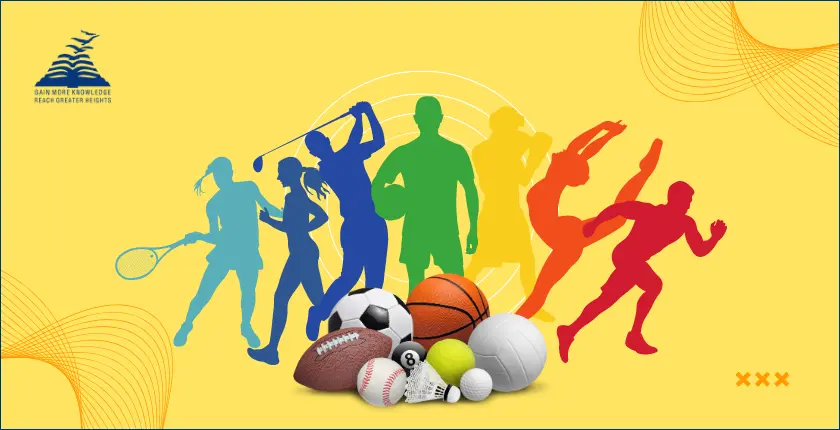Education in Bangalore’s finest institutions extends beyond mere physical activity, offering a plethora of advantages that significantly enrich a student’s holistic growth. From improved academic performance to enhanced social skills, incorporating sports into the curriculum can have a transformative impact on students.
This blog will discuss the seven important benefits that sports bring to education. So let’s dive in and discover how sports can shape young minds and create a brighter future
Why are sports Important?
Incorporating sports into the curriculum is an essential aspect of education. It plays an important role in shaping a student’s personality, contributing significantly to their overall growth and development, which demands a broad spectrum of academic knowledge.
While subjects are taught indoors, it is equally important for children to experience fresh air and engage in physical activity. This not only fosters valuable life skills but also provides benefits for education. Students should engage in many extracurricular activities, extending beyond traditional academic pursuits.
7 Benefits of Sports in Education
Sports and education are two seemingly different worlds that have actually been proven to go hand in hand. While academics focus on developing the mind, sports play a crucial role in shaping a student’s overall personality and character. The benefits of incorporating sports into education are numerous, with each aspect contributing to the holistic growth of an individual.
Promotes physical fitness and well-being
Children’s physical activity levels decline as they spend long periods of time studying. This places significant limits on their well-being. A lack of physical fitness and health can be detrimental to a child’s development. Children can greatly benefit from regular physical activity, and sports provide an excellent entry point.Growth of Emotions
The ups and downs of athletic competition can stir up a wide range of emotions. Having the ability to manage these extreme feelings is a sign of emotional maturity.
Participating in sports is not something that comes naturally to everyone, but it may help students overcome mental and emotional blocks and become a more well-rounded athlete. The path to emotional development can be paved this way. Overcoming challenges on the field builds resilience and perseverance in individuals as they learn to bounce back from failures or setbacks. This confidence transcends into other areas of life, such as academics or career pursuits.Development in Leadership Skills
One acquires leadership abilities through participation in sports, such as guiding teammates, creating a balance between diverse team players, maintaining a broad perspective, and setting and leading the team’s spirit and vision. Kids can learn to assert themselves and guide others in their personal and professional lives by taking on leadership responsibilities in sports.Encourages Perseverance and Continuity
Sports are typically competitive and can involve both success and defeat. This helps children get ready for challenges they could encounter later on. Athletes must put in countless hours of practice time to perfect a skill despite repeatedly falling short. Sports contribute significantly to cognitive development. Research has shown that regular participation in physical activities improves concentration levels, memory retention, problem-solving abilities, and overall academic performance. On a microlevel, sports do help develop important character traits like patience and tenacity.Improve Mental Health
Sports help a person develop their mind. Competitors’ mental states, for example, are just one of many aspects that call for athletes to make calculated decisions. In addition, kids can benefit emotionally and physically by engaging in sports during their free time.
It takes a lot of hard work, dedication, and determination to reach that one goal. Doing so develops self-control. Discipline is vital in both your personal and professional lives, regardless of your chosen path.Increases Confidence
Sports’ ability to boost students’ confidence is just one of many reasons why they should be incorporated in schools. Playing sports has been shown to boost a child’s sense of worth and confidence. A player’s self-assurance might be greatly bolstered if the coach singles him or her out for special recognition or praise. Children with low academic achievement tend to have low self-esteem and may turn to athletics as a strategy to improve their sense of value.Collaboration and Teamwork
For a team to succeed in a sporting event, all of its members must work together as a cohesive unit. Sports bring people together from diverse backgrounds, fostering inclusivity and promoting cultural exchange among students through friendly competition or joint events like tournaments or matches. This helps kids learn to put the needs of the group above their own and builds teamwork skills. The importance of these abilities extends far beyond the playground.
Schools in Bangalore are committed to promoting sports and physical activities. From swimming pools that encourage water sports and enhance fitness to basketball courts where students can learn teamwork and hone their basketball skills, these schools leave no stone unturned in nurturing a love for sports. The wide range of facilities available in educational institutions nowadays offers students abundant possibilities to cultivate a comprehensive range of athletic interests.
Conclusion
The inclusion of sports in education brings about a multitude of benefits that go beyond just physical fitness. By participating in sports activities, students not only improve their overall well-being but also learn important life lessons such as perseverance, resilience, and determination. These skills are invaluable assets that will serve them well throughout their lives.







